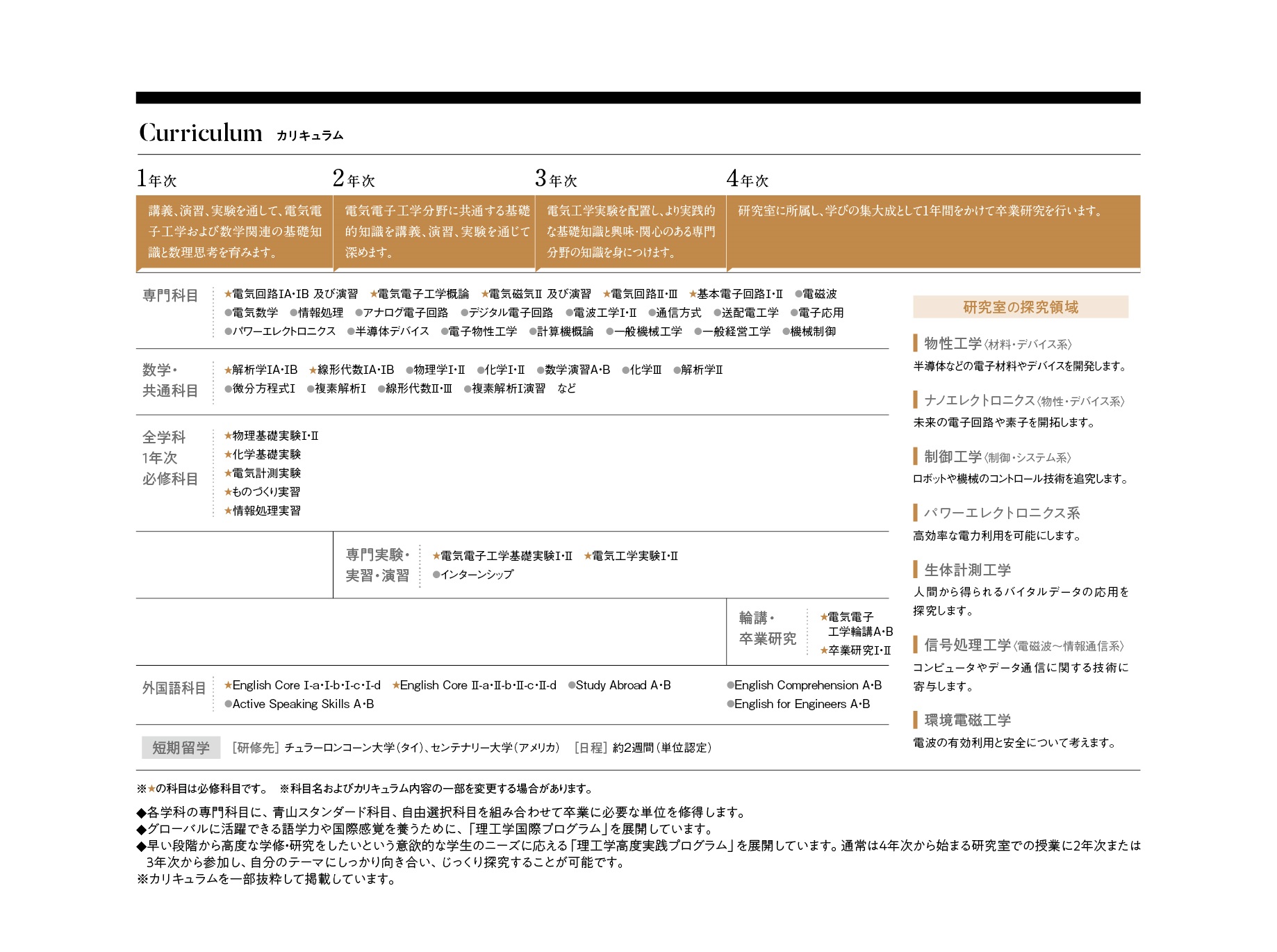- 2025年度 授業要覧 理工学部
学びの特色とカリキュラム(電気電子工学科)
※ここで紹介する履修モデルは、あくまでも一例です。
COURSE FEATURES 主要科目の特長
学科主要科目
| 科目名 | 特長 |
|---|---|
|
電気回路
|
電気電子工学における基幹科目である。電気電子工学の全ての専門領域の基礎となる電気回路理論の習得のみならず、回路解析を通じて事物に対するシステム的視点を養成する点が特徴である。アナログ線形受動回路の基本的理論から、分布定数回路、さらに、電気回路システムの過渡解析まで教授する。
|
|
電気磁気
|
電気回路と並ぶ電気電子工学における基幹科目である。電気電子工学の全ての専門領域に係る種々の電気・磁気的物理現象を理解することを目的とする。電界、電位、磁界、磁気ポテンシャルなど、導入における視点は物理学と共有するが、電気回路・電磁波・電気機器に通じる抽象的理論化の道筋を教授する点が特徴である。
|
|
システム制御
|
電気電子工学においてシステム理論を扱う専門領域である制御工学に関する科目である。自動車、航空機、ロボットなど、種々の機械の制御に必須となるシステム制御理論を習得することを目的とする。古典制御理論に基づいたシステムのモデリング・解析・設計から、線形時不変システムにおける現代制御理論まで広く教授する。
|
|
光エレクトロニクス
|
情報通信や計測技術などの基盤技術である光エレクトロニクスについて,基礎事項を理解するとともに応用分野の知識を習得することを目的とする。光物理から光デバイス・システム応用まで多様な技術レイヤーにわたる光エレクトロニクスに関して、光ファイバ通信工学応用の観点から教授する点が特徴である。
|
|
パワーエレクトロニクス
|
パワーエレクトロニクスは電力用半導体素子を利用して電力を制御する技術分野であり、家庭から電力系統まで、電気エネルギーを使用するあらゆる分野で重要な役割を果している。パワーデバイスの動作原理、インバータの動作原理、交流電動機の制御等、パワーエレクトロニクスの基礎と応用について教授する。
|
理工学部共通
| 科目名 | 特長 |
|---|---|
|
English CoreⅠ-a
|
主に英語のリーディング力並びにリスニング力向上を目指す。リーディング力としては、日常的に非常によく使用される表現で書かれた比較的短く簡潔なテキストを読み、内容を理解することができる力の獲得を目指す。また、リスニング力としては、はっきりとゆっくりとした発話・発音であれば、具体的な必要性を満たすことができる程度に理解できる力を養成する。
|
|
English CoreⅠ-b
|
英語の読解力と作文力を伸ばすことを目的とする。文章構成を理解し、内容を正確に読み取り、要約する力を養っていく。特に筆者の姿勢や視点が出ている記事や報告文が正確に読めるようになることを目標とする。また、関心ある話題についてつながりのあるテクストが書ける力を高めていく。正確な読解力・作文力のために、語彙・文法・句読法も取り上げる。
|
|
English CoreⅠ-c
|
英語のリスニングとスピーキング力を伸ばすことを目的とする。ゆっくりと明瞭に話された言葉を理解し、自分自身や自分の家族・学校・地域などの身の回りの事柄に関連した句や表現が把握できる力を養っていく。また、簡単な英語で意見や気持ちを伝達し、賛成や反対などの意見を表現し、類似点や相違点を表すことができるようになることを目指す。
|
|
English CoreⅠ-d
|
趣味や好き嫌いについて複数の文を用いて、簡単な語や基礎的な表現を使って書いたり、話したりすることができる。自分の経験について辞書を用いて、短い文章を書いたり、話したりすることができる。前もって発話することを用意した上で、日常生活に関する簡単な事実を、簡単な語や基礎的な句を限られた構文を用い、複数の文で描写できる。
|

